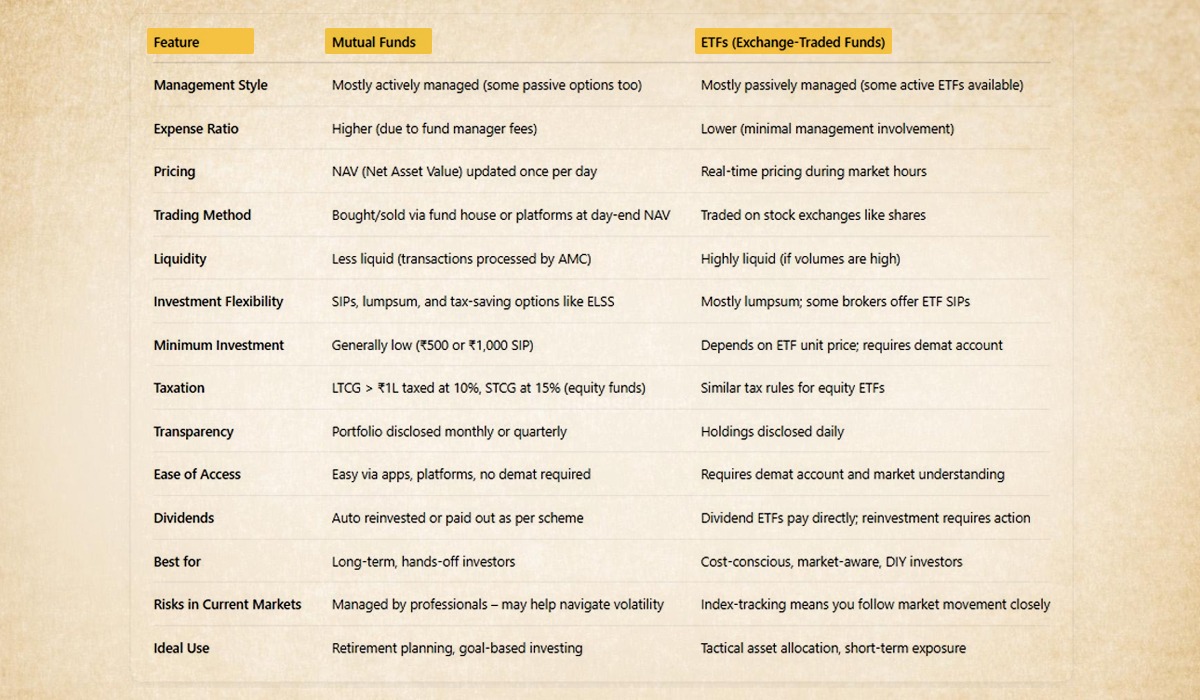
Mumbai: When it comes to investing in today’s market environment, many investors find themselves choosing between Mutual Funds and Exchange-traded funds (ETFs). Both offer diversified exposure to various assets, but their structure, costs and ideal use cases vary significantly. Understanding which one aligns best with your financial goals.
Both ETFs and mutual funds offer investors a low-cost way to invest in the stock market, as they provide diversification and professional management. However, ETFs trade on an exchange like stocks, while mutual funds are bought and sold through a fund house at the end of the trading day at the Net Asset Value (NAV).
Mutual Funds are typically actively managed, meaning a professional fund manager selects the portfolio intending to beat the market. This makes them an attractive option for long-term investors who prefer a hands-off approach. Mutual Funds also allow systematic investment through SIPs (Systematic Investment Plans), which promote disciplined investing. However, mutual funds come with higher expense ratios due to active management, and they are priced only once at the end of each trading day. Exit loads also apply if you withdraw funds early.
On the other hand, ETFs are actually passively managed and track a specific index. They are traded on Stock exchanges like regular shares, allowing investors to buy or sell them throughout the day at real-time prices. ETFs are cost-efficient, with lower expense ratios compared to mutual funds, and provide transparency as their holdings are disclosed daily. However, they require a demat account to trade, and some ETFs may face liquidity issues, especially in niche categories. Additionally, SIPs are not available for ETFs, although some platforms offer similar investing features.
In India, both Exchange-Traded Funds (ETFs) and Mutual Funds are popular investment options for retail investors. However, while both investment options have similarities, there are some critical differences between the two.
Here’s a detailed comparison between ETFs and Mutual Funds:

In the current market scenario, marked by volatility and economic uncertainity your choice between Mutual Funds and ETFs should reflect your investment style. It depends largely on your investment goals, risk tolerance, and how actively you want to manage your portfolio.
When to prefer Mutual Funds
♦If you are a long-term investor with specific goals (retirement, education etc.)
♦If you prefer professional fund management to navigate volatile markets.
♦If you want SIP options and don’t want to track the market daily
♦If you need tax-saving options like ELSS
♦If you don’t have a demat account
Actively managed mutual funds can be better in uncertain or sideways markets where fund managers can take tactical calls and rebalance based on sector performance.
When to prefer ETFs
♦If you are cost-concious and prefer low expense ratios
♦If you already have demat account and are comfortable with market trading
♦If you want to invest in Specific sectors or indices (e.g., Nifty 50, Banking, IT)
♦If you pefer daily transparency of holdings
♦If you want more liquidity (buy/sell anytime during trading hours)
ETFs are ideal when markets are trending or if you’re using them for short-term exposure or tactical asset allocation.
In Today’s Scenario
♦For new or passive investors : Go with a balanced or large capmutual fund to benefit from active management while limiting risk.
♦For market-aware investors or tradors: Explore ETFs tracking Nifty 50 or sectoral indices if you expect growth in those areas.
♦For Short-term exposure or hedging : ETFs are more flexible and cost-efficient.
♦For long-term wealth creation : Mutual funds via SIPs still remain one of the best tools.
